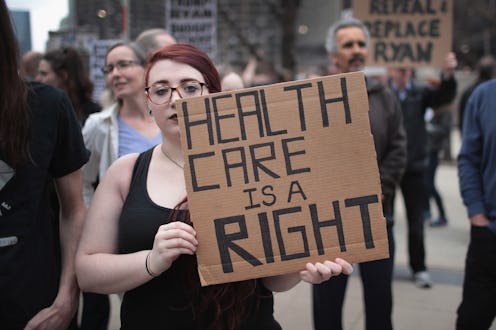News
What The 2018 Midterms Meant For Health Insurance & The Affordable Care Act

There's no doubt about it — both parties made it very clear that health care was on the ballot in 2018. The Democrats ran fiercely on the issue, and later the Republicans picked it up as well. Here's what the 2018 midterms mean for health insurance, according to experts. The big piece of the puzzle — the Affordable Care Act — is safe from repeal for the next two years. And there's more news that could protect or even expand access and coverage.
"We now have a Democratic-controlled House that can block efforts to repeal the Affordable Care Act [ACA, aka Obamacare]," Steven Lopez, the associate director of UnidosUS' health policy project, tells Bustle. "Having a chamber that was there to stop bad legislation like we saw last year, and having a chamber that was there to protect health care — I think that's critically important moving forward."
Lopez says that protecting Obamacare was a "top of mind" for voters, including Latino voters. UnidosUS conducted a poll in September that showed Latino voters said health care was the second most important issue to them at stake this election — after immigration.
Some 80 percent of Latino voters support popular provisions of Obamacare, like coverage for preexisting conditions, according to the UnidosUS poll. "They voted to reject the health care agenda that Republican leaders had advanced these last couple of years," Lopez tells Bustle. "Latino voters examined candidates' records on health care, and they voted accordingly."
The Affordable Care Act itself will be protected for the next two years with the current makeup of the House, but it has seen more challenges than just legislative repeal, Lopez tells Bustle. For example, court challenges continue and the administration's Department of Health & Human Services (HHS) has used its rule-setting ability to weaken the law — something that a Democratic-controlled House can also help with using its "oversight authority."
HHS has also issued waivers to states to change their rules on Medicaid. Lopez called that an effort to move away from the "mission of what Medicaid is" — providing coverage to low-income Americans — "and instead to erect barriers" to coverage. Some waivers approved by the Trump administration allow states to require Medicaid recipients work to gain coverage.
In both these cases, Democrats in the House can now hold hearings and make officials answer as to why they're making these changes, Lopez tells Bustle. He says hearings allow agency officials to be held accountable, "having them explain to lawmakers what it is they're doing and the harm it is imposing on many folks across the country."
As for court challenges to the Affordable Care Act, a case led by several Republican attorneys general continues to make its way through the court system. One of those Republicans, the Wisconsin Attorney General Brad Schimel likely lost his seat to Democrat Josh Kaul (Schimel acknowledged his opponent's lead though he has not conceded). Kaul promised to switch sides and join the Democrats who are arguing in favor of the law.
He will be joined by other newly elected Democrats winning the attorney general race in their states, like Dana Nessel in Michigan and Letitia James in New York. Many other prominent Democratic attorney generals defending Obamacare in the case were also reelected, like California's Attorney General Xavier Becerra.
Another bright spot for expanded health care access this election were the ballot initiatives in three Republican states. Voters in Utah, Idaho, and Nebraska voted to expand Medicaid as prescribed under the Affordable Care Act. Democratic wins in other statehouses like Wisconsin and Kansas could add to that number, too.
Health care was a big debate throughout the election season. The Republican attempt to repeal the Affordable Care Act in 2017 led Democrats to campaign heavily on the issue of health insurance coverage.
Seeing the energy surrounding that particular issue, though, Republicans started claiming that they would protect Obamacare's most popular elements — like coverage for preexisting conditions — The Hill reported.
Voters seemed to trust Democrats over the new Republican promises to protect coverage for people with preexisting conditions. "If there was any bright spot, it's that the American people, including Latinos, understood just how fundamental these programs are for our families to become healthy and economically secure," UnidosUS' Lopez tells Bustle. "That's a message that was sent last night by Latino voters."
Lopez says the engagement on health care doesn't end at the voting booth, and Latino voters will be expecting their elected officials — Democrats and Republicans — to work for solutions to make health care more accessible and affordable. "Health care will be on the agenda" in this next Congress, he says, even though exactly how remains to be seen.
That means the work to protect health care access — and expand it — is far from over. "The threats are going to continue from the Trump administration and the courts," Lopez tells Bustle. "We have to remain vigilant and ensure that we continue to organize and hold our elected officials accountable."
Lani Seelinger contributed to this report.